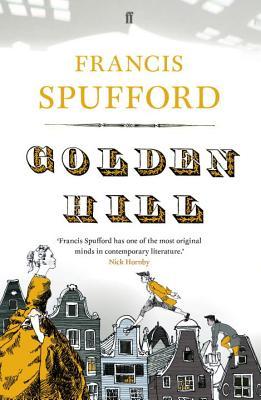Our book group choice for February 2017 is Golden Hill by Francis Spufford. One rainy evening in November, a handsome young stranger fresh off the boat pitches up at a counting-house door in Golden Hill Street: this is Mr Smith, amiable, charming, yet strangely determined to keep suspicion simmering.
Golden Hill is a historical novel set in New York City in 1746. The novel follows the mysterious arrival of a young man named Mr. Smith, who comes to town with a bill of exchange for £1,000. Smith’s identity and purpose are unknown, and he quickly becomes the subject of speculation and gossip.
Smith soon becomes involved in the lives of several other characters, including the beautiful and wealthy Sarah Woodcock, the mysterious and dangerous Captain Kidd, and the idealistic young lawyer John Lamb. As Smith’s story unfolds, it becomes clear that he is not who he seems, and that his arrival in New York is no coincidence.
The novel is set against the backdrop of a rapidly changing New York City. The city is growing and becoming more diverse, and the old order is beginning to crumble. Smith’s arrival coincides with a series of mysterious events, including the theft of a valuable necklace and the disappearance of a young woman. As the novel progresses, it becomes clear that these events are all connected, and that they are part of a larger conspiracy.
Golden Hill is a complex and suspenseful novel that explores themes of identity, deception, and the nature of power. The novel is beautifully written, and Spufford does an excellent job of bringing 18th-century New York City to life. The characters are well-developed and engaging, and the plot is full of twists and turns.
One of the most striking things about Golden Hill is its sense of place. Spufford has a deep knowledge of 18th-century New York City, and he brings the city to life in vivid detail. The reader can almost feel the cold rain on their face and smell the smoke from the ships in the harbor.
The characters in Golden Hill are also well-developed and engaging. Smith is a complex and enigmatic figure, and the reader is never quite sure what to make of him. Sarah Woodcock is a beautiful and intelligent woman who is struggling to find her place in the world. Captain Kidd is a dangerous and unpredictable figure who is always one step ahead of the law. John Lamb is an idealistic young lawyer who is determined to make a difference in the world.
The plot of Golden Hill is full of twists and turns. The reader is never quite sure what is going to happen next, and the novel keeps the reader guessing until the very end. The novel also explores a number of interesting themes, including identity, deception, and the nature of power.
Discussion Questions Golden Hill
- Given the narrator is unreliable (if very funny) is there any character in the book that you can actually trust?
- If Wexford had a slave trade in 1746, would it have grown as much as New York?
- What historical aspects of the story did you find the most interesting? What were you unaware of, historically speaking, before reading this novel?
- Did you find Richard Smith a likeable character? Do you think he was meant to be the hero of the story, or was someone else? Explain.
- There was a lot of political maneuvering and spying in the novel. How do you think this works in the narrative? Does it reveal or obscure? Does it propel the main plot, or is it a subplot? Explain.
- Why do you think the author chose to reveal so little of Richard’s backstory? What do we know versus what do we guess to be true about him?
- Which characters would you like to know more about? Are there other characters whose stories you would like to see in a follow up novel? Which ones and why?
- What do you think the significance of the title, Golden Hill, is?
- What do you think the novel is trying to say about the nature of identity and self-discovery?
- How does the novel explore the themes of colonialism and empire?
- How does the novel depict the relationship between New York and Britain?
- What does the novel say about the role of women in the 18th century?
- How does the novel explore the themes of love, loss, and redemption?
- What do you think the novel’s ending means?
- How does the novel compare to other historical novels you have read?
- What did you think of the novel’s style?
- Would you recommend this novel to others? Why or why not?

